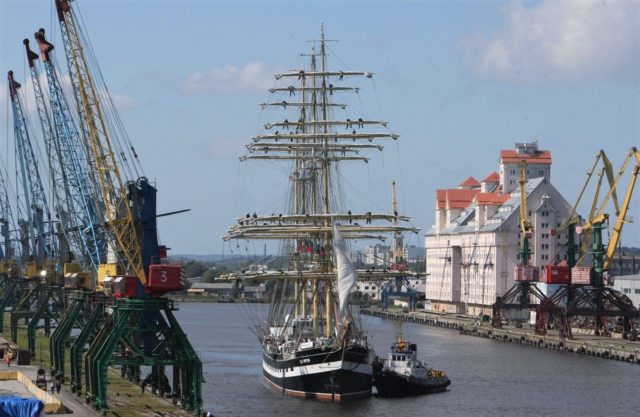
Is Kaliningrad on Its Way to Becoming ‘Russia’s Crimea?’
Publication: Eurasia Daily Monitor Volume: 14 Issue: 14
By:

Ever since Vladimir Putin’s Crimean Anschluss, Moscow analysts have occasionally worried that the West might respond by trying to seize the Russian exclave of Kaliningrad in revenge. Russian fears are that the West will exploit Kaliningrad’s geographic isolation, unhappiness among its population and even among some of its officials, and the interests of neighboring countries to recover territory that Soviet leader Joseph Stalin took in 1945. Most articles raising this possibility appear to reflect an underlying Russian paranoia and a desire to muddy the waters about what Moscow has done in Crimea (Regnum, December 9, 2015 and December 15, 2016; Finobzor.ru, February 27, 2016; Windowoneurasia2.blogspot.com, December 10, 2015 and February 27, 2016 and December 26, 2016). Alternatively, these commentaries serve as a justification for Russian aggression in the region or as an excuse for the kind of broad crackdown on dissent that President Vladimir Putin has been carrying out across the country.
But three developments in the last week suggest that Moscow may be more worried about the future of Kaliningrad now than ever before—and have more reason to be. All this has less to do with what any other country wants vis-à-vis the Russian Baltic oblast than with how the people and some officials in that exclave themselves feel.
First—reflecting Moscow’s fears about how the people of Kaliningrad think—the oblast authorities there have launched a new and far broader crackdown against any foreign ties or efforts to restore older identities. They have closed the German-Russian House, which had promoted interest in the history of the region—both from before and after the Soviet Union took it from Germany at the end of World War II. Apparently even that is now too much for the Putin regime to tolerate (Newkaliningrad.ru, January 28, 2017). At the same time, officials in the oblast have threatened all those who want to restore the original name of Königsberg to the oblast with criminal charges of promoting separatism (Regnum, February 4).
Over time, the people living in the oblast have developed a unique regional identity separate from the Russian ethnos. And they are more likely to have traveled to neighboring European Union countries like Lithuania and Poland than to Russia proper. Consequently, Moscow appears worried that ever more of them are becoming interested in going their own way—perhaps of becoming “the fourth Baltic republic,” as some Kaliningrad activists in the 1990s suggested—than in remaining inside the Russian Federation.
Second, when a Lithuanian parliamentarian suggested that Kaliningrad’s status should be changed, Moscow’s reaction both officially and in the media was so hyperbolic that Vilnius was forced to declare that it would never raise the issue again (Eadaily.com, January 28; Qha.com.ua, Svpressa.ru, Belaruspartisan.org, Politobzor.net, Rubaltic.ru, January 30; Kasparov.ru, January 31). The extreme Russian reaction far exceeded any of Moscow’s previous rebukes of suggestions that some or another part of the Russian Federation should not properly remain within its borders. This implies that the Lithuanian parliamentarian’s comments must have hit a nerve—not only in the context of worsening bilateral relations because of Lithuania’s tough position on Russian aggression in Ukraine, but also with regard to the possibility of a change in the status of Kaliningrad (Königsberg).
And third, in case there was any doubt about that, Moscow political commentator Grigory Trofimchuk pointedly asked whether “a Ukrainian scenario” directed against Russia was possible in Kaliningrad given that the oblast now seems balanced “between Kaliningrad and Königsberg” (Regnum, January 31). To raise such issues, even if only to debunk them, points to just how nervous some in Moscow may be or how willing they are to create a provocation to justify more offensive Russian actions against Lithuania and Poland.
The proximate cause of Trofimchuk’s comments was the suggestion by Kaliningrad leaders that if Lithuania wants to build a wall along the Lithuanian-Russian border, they would be happy to sell Vilnius the bricks to do so. According to the Moscow commentator, the region is “not a place where such humor is either appropriate or useful, especially after the disintegration of the Soviet Union.” Such attitudes toward history and current threats created a real crisis about regional separatism in Kaliningrad in the 1990s which, he says, apparently too many people have forgotten and are acting in ways that will reignite it.
That is something Putin understands, even if regional officials and some others do not. At the start of his presidency, the Kremlin leader moved against any separatist challenges around the country, including those in Kaliningrad, Trofimchuk says. And since 2014, Putin has recognized the need to do so again: “many opponents of Moscow have begun to look at Kaliningrad as a natural compensation for European territorial losses and a form of ‘compensation’ for the inclusion of Crimea into the Russian Federation,” Trofimchuk writes (Regnum, January 31).
Jokes about providing bricks for some new wall are one thing, but there is something more serious afoot, he argued. In their rushing after popularity at home and in Europe, Kaliningrad officials have not only restored many German-era buildings but brought back German toponyms in their daily work. In particular, the Regnum commentator points out, there has been “the reanimation of the word ‘Danzig’ [the Polish port city of Gdańsk] on maps of the regional administration, which the world practically had not heard since pre-war times [pre–World War II],” when Adolf Hitler demanded a “Polish corridor” for Nazi Germany and then moved to invade Poland.
Kaliningrad officials should not play at foreign policy: they do not know enough and it is not part of their job description, Trofimchuk asserts. According to the Regnum author, the authorities of the Russian Baltic exclave must bring in Moscow experts to advise them on such things because otherwise, they will open—intentionally or not—a Pandora’s box, out of which all kinds of evils will come.



